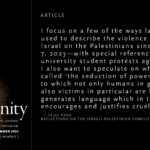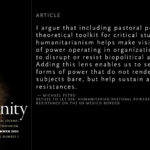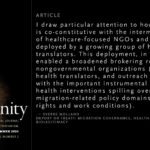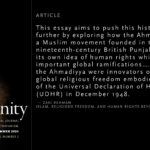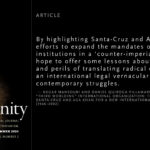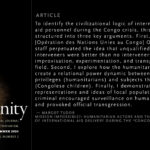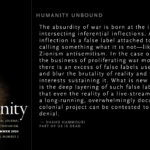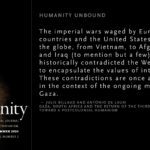In the remarks that follow, I focus on a few of the ways language is used to describe the violence unleashed by Israel on the Palestinians since October 7, 2023—with special reference to the university student protests against it. But I also want to speculate on what can be called “the seduction of power,” something to which not only humans in general but also victims in particular are liable. Power generates language which in turn often encourages and justifies cruelty. Continue reading →
Moving beyond focuses on humanitarian extensions of biopolitics, recent scholarship has begun to explore techniques of resistance in practices of aid, development, and relief. While these shifts are welcome, they often leave undertheorized the processes by which such resistances actually undermine biopower, particularly at the level of organizations’ ethico-political efforts to form their subjects, resistant or otherwise. This article offers “pastoral power,” a medieval form of conduct-shaping and individualizing power in Michel Foucault’s genealogy of governmentality, as a resource for theorizing humanitarian practices as resistance. Continue reading → Continue reading →
This paper examines how biolegitimacy and brokering are central to labor migration governing regimes in Thailand. Whereas undocumented migrants would risk deportation whilst seeking health services in the past, current policy responses favor medical treatment – as opposed to deportation – regardless of patients’ legal migrant status. Exploring how migrants’ corporal bodies give rise to new forms of policy practices and claim-making, the paper explicates how these changes have enabled a broadened operational space for aid agencies that assist labor migrants. At the same time, Continue reading → Continue reading →
The past two decades have seen a revived debate about the relationship between religion and human rights, with some historians suggesting that the origins of the latter are more to be found in mid-twentieth Christianity than the liberal secular project from which they have today become inseparable. And yet, there is limited work on the relationship between Islam and human rights from a similarly historical perspective. This essay seeks to fill this lacuna by illustrating the ways in which the Ahmadiyya, a Muslim movement founded Continue reading → Continue reading →
The literature on the history of international organization tends to highlight the dominant role of European internationalists and their (arguably) secular cosmopolitan visions in the life and functioning of these institutions. Conversely, in our contribution, we trace the parallel trajectories of two path-breaking figures in the United Nations (UN) with affinities with the Global South and between the 1950s and 1990s: Hernán Santa-Cruz and Sadruddin Aga Khan. In the tense international (dis)order of the Cold War, they both relied on a combination of Third Worldist Continue reading → Continue reading →
This article examines the historical lineages and colonial logics underpinning humanitarian officials’ misconduct and the justifications for their actions whilst deployed to the UN peacekeeping mission Opération des Nations Unies au Congo or ONUC, (1960-1964). Using analysis of oral testimonies, UN video footage, personal papers, and newspaper articles, it pieces together a fragmentary history of humanitarian officials’ conduct on the ground and draws attention to the colonial continuities in Western humanitarian practice during decolonisation. Focusing on instances of field-based transgression by international officials deployed during Continue reading → Continue reading →
When the absurd is sustaining a slaughterhouse and we are witnesses. When our collective will to stop the slaughterhouse is met with imaginary structures built for us to fight with. A part of our common humanity and ourselves is dead. This death is not a source of despair, but newly found sense of ironic fearlessness. Continue reading →
International law has historically been manipulated to render acceptable the suspension of liberal normative standards when it comes to violence and suffering perpetrated against non-Western populations. Yet the litigation initiated by South Africa against Israel at the International Court of Justice illustrates the Global South’s unwavering commitment to challenge the international world order through legal means. Can the case of Palestine propel the ‘return’ of the political project of the Third World on the international stage and revive its insurgent and decolonial spirit at the Continue reading → Continue reading →
